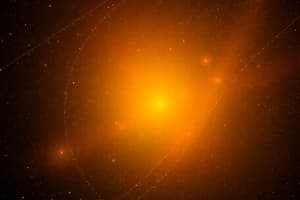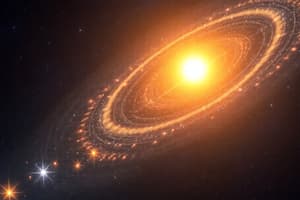Podcast
Questions and Answers
What type of data is graphed along the X-Axis in an H-R Diagram?
What type of data is graphed along the X-Axis in an H-R Diagram?
- Spectral class
- Temperature (correct)
- Luminosity
- Brightness
What is the relationship between temperature and brightness for main sequence stars?
What is the relationship between temperature and brightness for main sequence stars?
- Brightness increases, but temperature remains constant
- As temperature increases, brightness decreases
- As temperature increases, brightness increases (correct)
- There is no relationship between temperature and brightness
What type of star is the hottest?
What type of star is the hottest?
- Red Supergiant
- M-type star
- White Dwarf
- Blue Giant (correct)
Which type of star is the brightest?
Which type of star is the brightest?
What does Absolute Magnitude measure for a star?
What does Absolute Magnitude measure for a star?
Why do white dwarf stars have a low brightness when they are so hot?
Why do white dwarf stars have a low brightness when they are so hot?
What does the H-R Diagram graph on the Y-Axis?
What does the H-R Diagram graph on the Y-Axis?
What type of star is our sun classified as?
What type of star is our sun classified as?
'O' stars are characterized as being:
'O' stars are characterized as being:
At what point do stars begin in an H-R Diagram?
At what point do stars begin in an H-R Diagram?
What effect does increasing temperature have on the brightness of main sequence stars?
What effect does increasing temperature have on the brightness of main sequence stars?
Which type of star is the hottest?
Which type of star is the hottest?
What type of star is the brightest?
What type of star is the brightest?
Why do white dwarf stars have a low brightness despite being hot?
Why do white dwarf stars have a low brightness despite being hot?
What does Absolute Magnitude measure for a star?
What does Absolute Magnitude measure for a star?
What type of star is our sun classified as?
What type of star is our sun classified as?
What is the relationship between temperature and luminosity for main sequence stars in the H-R Diagram?
What is the relationship between temperature and luminosity for main sequence stars in the H-R Diagram?
At what point in the H-R Diagram do stars begin their life cycle?
At what point in the H-R Diagram do stars begin their life cycle?
'O' stars are characterized as being:
'O' stars are characterized as being:
What type of data is graphed along the Y-Axis in an H-R Diagram?
What type of data is graphed along the Y-Axis in an H-R Diagram?
Flashcards are hidden until you start studying
Study Notes
H-R Diagram
- Temperature (in Kelvin) is graphed along the X-Axis in an H-R Diagram, typically ranging from 1,000 to 50,000 K.
- The relationship between temperature and brightness for main sequence stars is direct, with increased temperature resulting in higher brightness.
- 'O' stars are the hottest type of star.
- 'O' stars are also the brightest type of star.
Star Characteristics
- Absolute Magnitude measures the intrinsic brightness of a star, which is its brightness at a standard distance of 10 parsecs.
- White dwarf stars have a low brightness despite being hot due to their small size, which results in a lower surface area and consequently lower luminosity.
H-R Diagram Structure
- The Y-Axis of an H-R Diagram represents the luminosity or brightness of stars, typically measured in units of solar luminosity (L).
- Our sun is classified as a G-type main-sequence star (G2V).
- Stars begin their life cycle at the main sequence stage in the H-R Diagram, where they fuse hydrogen into helium in their cores.
Additional Information
- 'O' stars are characterized as being extremely hot and luminous.
- Increasing temperature has a direct effect on the brightness of main sequence stars, resulting in higher luminosity.
Studying That Suits You
Use AI to generate personalized quizzes and flashcards to suit your learning preferences.




